What’s a vegan diet? It’s a lifestyle that abstains from all animal products, embracing a plant-based existence. From ethical concerns to health benefits, the vegan diet is gaining traction, inviting us to explore its multifaceted implications.
This comprehensive guide delves into the intricacies of veganism, examining its food sources, nutritional value, ethical considerations, health implications, and practical aspects. Join us as we unravel the essence of a vegan lifestyle, empowering you to make informed choices about your dietary journey.
Food Sources
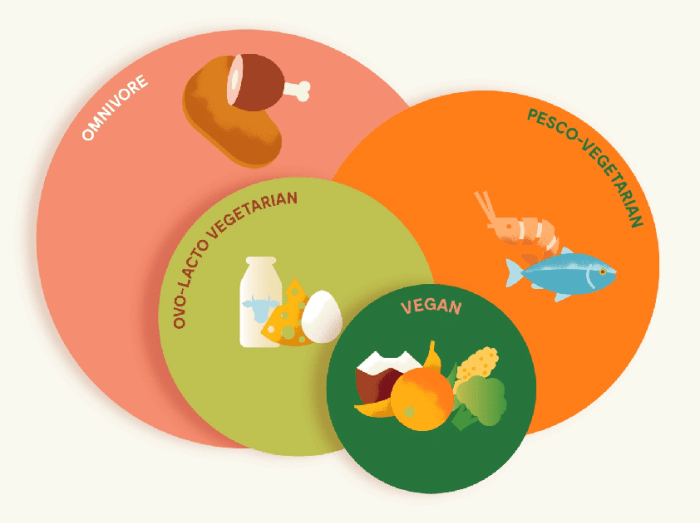
A vegan diet is centered around plant-based foods, excluding all animal products. These include fruits, vegetables, legumes, nuts, seeds, and whole grains. Vegan foods are rich in essential nutrients like fiber, vitamins, minerals, and antioxidants.
Ensuring a balanced vegan diet requires careful planning to obtain all the necessary nutrients. It is important to consume a variety of foods from different food groups to meet daily nutrient requirements.
Legumes
Legumes are a valuable source of plant-based protein, fiber, and iron. They include beans, lentils, chickpeas, and peas. Legumes are versatile and can be incorporated into various dishes, such as soups, salads, and curries.
Nuts and Seeds, What’s a vegan diet
Nuts and seeds are excellent sources of healthy fats, protein, and fiber. They provide essential fatty acids, vitamins, and minerals. Nuts and seeds can be enjoyed as snacks, added to salads, or used in baking.
Fruits and Vegetables
Fruits and vegetables are the foundation of a vegan diet. They provide a wide range of vitamins, minerals, antioxidants, and fiber. Fruits and vegetables should be consumed in a variety of colors to ensure a diverse intake of nutrients.
Health Implications
Adopting a vegan diet has numerous potential health benefits, including reduced risk of certain chronic diseases, improved weight management, and enhanced nutrient intake. However, it’s essential to be aware of the potential risks associated with this dietary choice and to take steps to mitigate them.
Benefits of a Vegan Diet
- Reduced Risk of Chronic Diseases:Studies have shown that vegans have a lower risk of developing heart disease, type 2 diabetes, and some types of cancer, such as colon and breast cancer.
- Improved Weight Management:Vegan diets are typically rich in fiber and low in calories, which can promote satiety and support weight loss.
- Enhanced Nutrient Intake:Vegan diets provide a wide range of vitamins, minerals, and antioxidants, including fiber, vitamin C, vitamin E, folate, and potassium.
Risks of a Vegan Diet
- Vitamin B12 Deficiency:Vitamin B12 is primarily found in animal products, so vegans must ensure they consume fortified foods or supplements to avoid deficiency.
- Iron Deficiency:Iron absorption is less efficient from plant sources compared to animal sources, so vegans may need to consume iron-rich foods, such as beans, lentils, and fortified cereals, and combine them with vitamin C-rich foods to enhance absorption.
- Omega-3 Fatty Acid Deficiency:Omega-3 fatty acids are essential for heart and brain health, and they are primarily found in fatty fish. Vegans can obtain omega-3s from plant sources, such as flaxseed, chia seeds, and walnuts, but they may need to supplement to ensure adequate intake.
Mitigating Risks
To mitigate the potential risks of a vegan diet, it’s crucial to:
- Consume Fortified Foods or Supplements:Regularly consume fortified foods or supplements to ensure adequate intake of vitamin B12, iron, and omega-3 fatty acids.
- Plan Meals Carefully:Plan meals to include a variety of iron-rich and vitamin C-rich foods to enhance iron absorption.
- Consult a Healthcare Professional:Consult with a registered dietitian or other healthcare professional for personalized advice on meeting nutritional needs on a vegan diet.
Ethical Considerations
Veganism presents ethical implications that extend beyond personal health choices. It challenges the conventional practices of animal agriculture and raises concerns about the treatment of animals and their environmental impact.
The intensive farming practices employed in animal agriculture raise concerns about animal welfare. Animals are often subjected to cramped and unsanitary living conditions, routine mutilations, and premature slaughter. Veganism advocates for the inherent value of all animals and rejects the commodification of sentient beings for human consumption.
Environmental Impact
Animal agriculture is a significant contributor to environmental degradation. The production of animal-based foods requires vast amounts of land, water, and energy. Livestock grazing leads to deforestation, soil erosion, and water pollution. Methane emissions from cattle contribute to greenhouse gas emissions, exacerbating climate change.
Embarking on a healthy vegan diet requires careful planning to ensure you’re meeting your nutritional needs. Check out our comprehensive guide on how to eat a healthy vegan diet to learn the basics, including essential nutrients, food sources, and meal planning tips.
Adopting a plant-based lifestyle can not only improve your overall health but also contribute to a more sustainable planet.
Arguments for and Against Veganism
The ethical implications of veganism have sparked debates. Supporters of veganism argue that it is the morally consistent choice for those concerned about animal welfare and environmental sustainability. They emphasize the sentience and capacity for suffering of animals, as well as the devastating impact of animal agriculture on the planet.
Opponents of veganism argue that it is an overly restrictive diet that may compromise human health. They also contend that moderate consumption of animal products can be sustainable and does not necessitate the complete elimination of meat and dairy from the diet.
Practical Considerations
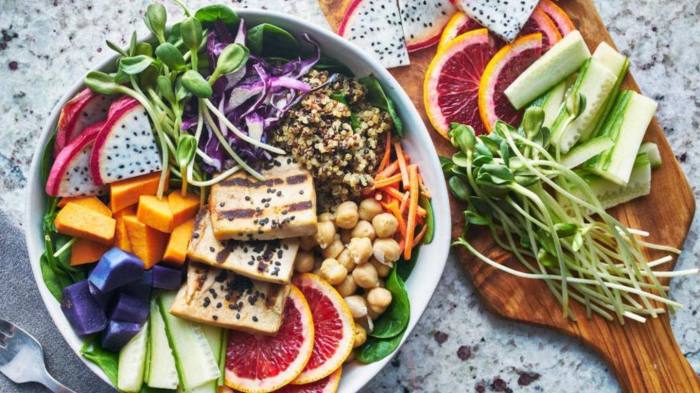
Adopting a vegan diet requires careful planning and consideration. Transitioning gradually, seeking support, and utilizing available resources can enhance success and address challenges.
Embarking on a healthy vegan diet can be a transformative journey, enriching your body with wholesome plant-based goodness. By following the comprehensive guide at how to eat a healthy vegan diet , you’ll discover the secrets to creating balanced and flavorful meals that support your well-being.
Tips for Transitioning to a Vegan Diet
- Start by incorporating more plant-based foods into your meals.
- Explore vegan recipes and cookbooks for inspiration and guidance.
- Gradually reduce animal products over time, rather than eliminating them abruptly.
- Consider consulting a registered dietitian or healthcare professional for personalized advice.
Challenges of Maintaining a Vegan Diet
- Limited access to vegan options in certain social or dining situations.
- Ensuring adequate intake of essential nutrients, such as vitamin B12 and iron.
- Navigating social pressures and misconceptions about veganism.
Resources for Vegan Support
- Online forums and communities dedicated to veganism.
- Vegan organizations and advocacy groups.
- Vegan cookbooks, recipe websites, and meal planning services.
Final Summary
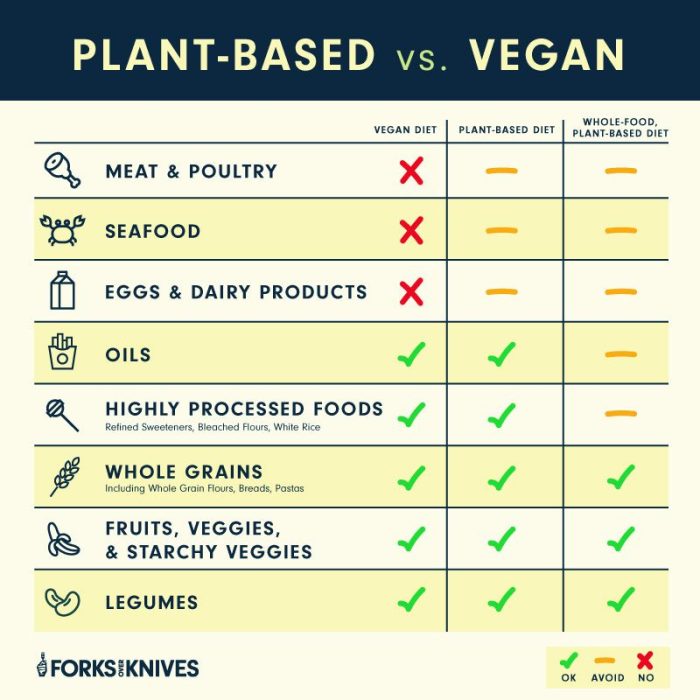
The vegan diet is not merely a dietary restriction; it’s a transformative philosophy that intertwines ethics, health, and sustainability. By embracing plant-based living, we can nourish our bodies, protect animals, and contribute to a greener planet. As you embark on this vegan adventure, remember that knowledge is power.
Stay informed, seek support when needed, and let your passion for compassion guide your choices.
Answers to Common Questions: What’s A Vegan Diet
Is a vegan diet healthy?
Yes, a well-planned vegan diet can provide all the essential nutrients for optimal health. It’s rich in fruits, vegetables, whole grains, and legumes, offering a wealth of vitamins, minerals, fiber, and antioxidants.
What are the challenges of a vegan diet?
Ensuring adequate intake of certain nutrients, such as vitamin B12 and iron, requires careful planning. Reading food labels, consulting with a registered dietitian, and considering supplementation may be necessary.
How do I transition to a vegan diet?
Start gradually by incorporating more plant-based foods into your meals. Reduce meat and dairy consumption, experiment with vegan recipes, and seek support from online communities or vegan mentors.

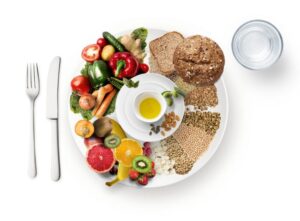
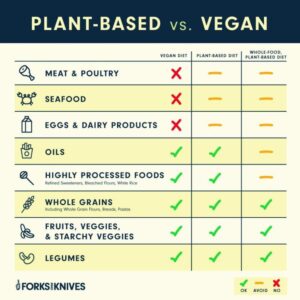
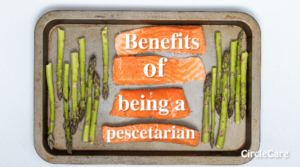
Leave a Comment